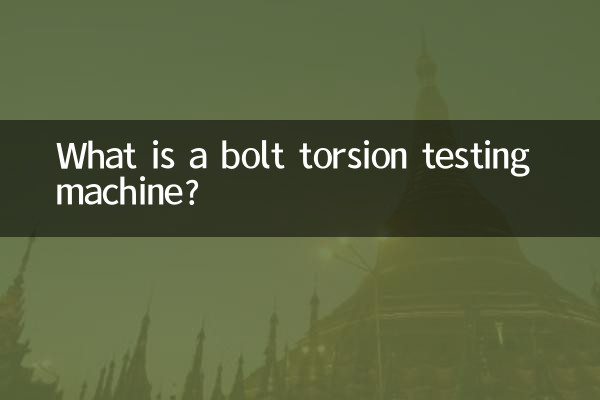What is a bolt torsion testing machine?
In industrial manufacturing and engineering, the quality and performance of bolts is critical. In order to ensure the reliability and safety of bolts, a variety of mechanical performance tests need to be carried out, among which torsion testing is one of the important methods to evaluate the torsional strength of bolts. This article will introduce in detail the definition, working principle, application scenarios and related technical parameters of the bolt torsion testing machine to help readers fully understand this equipment.
1. Definition of bolt torsion testing machine

The bolt torsion testing machine is a device specially used to test the performance of bolts, screws, nuts and other fasteners under torsion force. It measures the deformation, breaking strength and other parameters of the bolt during the torsion process by applying torque to evaluate its torsional performance and durability.
2. Working principle of bolt torsion testing machine
The bolt torsion testing machine is driven by a motor or hydraulic system to apply torque to the specimen. Equipment is usually equipped with high-precision sensors that monitor changes in torque and torsion angle in real time and transmit the data to a computer system for analysis. The test results can be used to determine whether the bolt meets industry standards or user requirements.
3. Application scenarios of bolt torsion testing machine
Bolt torsion testing machines are widely used in the following fields:
1.automobile manufacturing: Test the bolt performance of key parts such as automobile chassis and engine.
2.Aerospace: Ensure that bolts used in aircraft structural parts have high torsional strength.
3.construction project: Evaluate the reliability of steel structure connecting bolts.
4.Machinery manufacturing: Verify the durability of fasteners in mechanical equipment.
4. Technical parameters of bolt torsion testing machine
The following are the technical parameters of common bolt torsion testing machines:
| Parameter name | Typical value | Description |
|---|---|---|
| Maximum torque | 1000N·m | Maximum torque value that the device can apply |
| Torque accuracy | ±1% | Error range of measurement results |
| Twist angle range | 0°-360° | The angle range that the device can test |
| Test speed | 0.1-10RPM | Rotation speed for torsion test |
| Sample diameter | M6-M24 | Testable bolt diameter range |
5. Test standards for bolt torsion testing machines
Bolt torsion testing generally follows the following international or industry standards:
| Standard number | Standard name | Scope of application |
|---|---|---|
| ISO 898-1 | Fastener mechanical properties | Carbon and Alloy Steel Bolts |
| ASTM F568M | Metal fastener test methods | Metric fasteners |
| GB/T 3098.1 | Fastener mechanical properties | Chinese national standards |
6. How to choose a bolt torsion testing machine
When selecting a bolt torsion testing machine, the following factors need to be considered:
1.Testing requirements: Determine equipment parameters based on bolt specifications and testing standards.
2.Accuracy requirements: High-precision sensors provide more reliable test results.
3.degree of automation: Automated equipment improves testing efficiency and data accuracy.
4.Brand and service: Choose a well-known brand to ensure after-sales support and maintenance services.
7. Conclusion
Bolt torsion testing machine is a key equipment to ensure the quality of fasteners and is widely used in various fields of industrial manufacturing. Through scientific testing and analysis, the reliability and safety of bolts can be effectively improved, ensuring the smooth implementation of engineering projects.

check the details

check the details